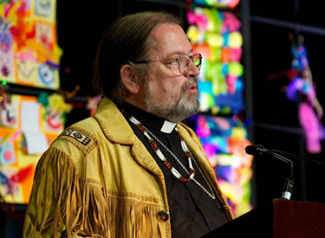The Call to Reconciliation
- Image

On December 15, 2015, the Truth and Reconciliation Commission of Canada (TRC) released its final report. Telling the truth about the brutal legacy of residential schools in Canada has been a long process. The commission has been gathering and responding to survivor stories since June 2008, and while individual Canadians will continue to speak and listen to stories that have yet to be told, now that we’ve taken this first step of the journey, we are faced with the question of how to make reconciliation a reality.
What role does a Christian religious community and an educational institution like Ambrose have to play in reconciliation? In March Bishop Mark MacDonald will be coming to Ambrose to help us explore this question. Mark is the Anglican Church of Canada’s first National Indigenous Bishop, and there will be a number of opportunities to hear him speak on why we should repent—or express our change of mind and willingness to change direction—when it comes to colonial attitudes and actions that demean and harm Indigenous people.
Why repentance?
The church has played a central role in perpetuating racism against Indigenous people in Canada, so as a Christian community we have the opportunity to repent. We can choose peace instead of abuse and healing instead of indifference. Even though, as evangelicals, it might be tempting to think we can distance ourselves from the mainline churches that officially ran residential schools, we want to think seriously about why our repentance is necessary and what it might look like.
Education matters
Schooling has also played a central role in instilling the message of settler superiority in all of us, whether the schools we attended were residential or not. According to Justice Murray Sinclair, Chair of Canada’s Truth and Reconciliation Comission, this means that education is also the key to undoing our prejudice and the harm it has caused.
As an educational institution, Ambrose can help make reconciliation a reality by telling the truth about Canada’s past and by demonstrating respect and love for Indigenous cultures into the future.
Mark your calendars
From March 1 – 2 Mark will be speaking at several times and places on campus:
- Tuesday March 1, 11:15 am – Chapel
- Tuesday March 1, 7:00 pm – Public lecture followed by panel discussion
- Wednesday, March 2, 9:00 am – Open class lecture, location TBA
Watch the Ambrose website and follow us on social media to stay in the loop.
Four Ways to Start Learning
1. READ UP ON CANADA’S TRC FINDINGS.
The reports contain a lot of information, so a manageable place to start is the list of Calls to Action—these are ways that we can take steps to right past wrongs. Check out the sections on Church Apologies and Reconciliation, and Education for Reconciliation (pg. 7).
2. LISTEN TO A PODCAST WITH A FOCUS ON INDIGENOUS ISSUES.
CBC Radio has some great options with Unreserved—“radio space for Indigenous community, culture, and conversation,” and New Fire–a program that focuses on “conversations important to Aboriginal youth.”
Here’s a great clip from the Dec. 6 episode of Unreserved with TRC Chair Justice Murray Sinclair talking about what reconciliation means to him.
3. LEARN ABOUT TREATY 7.
Treaty 7 is an agreement that has been in place in Southern Alberta since 1877; today, it still governs the relationship between settlers and First Nations communities in and around Calgary.
4. CHECK OUT EVA MACKEY’S ESSAY “THE APOLOGIZERS’ APOLOGY” IN THE BOOK RECONCILING CANADA.
The TRC is not Canada’s first attempt at reconciliation. Mackey’s essay examines the history of apology in Canada to provide an in-depth critique of the way apology has been used to maintain privilege and avoid blame.
